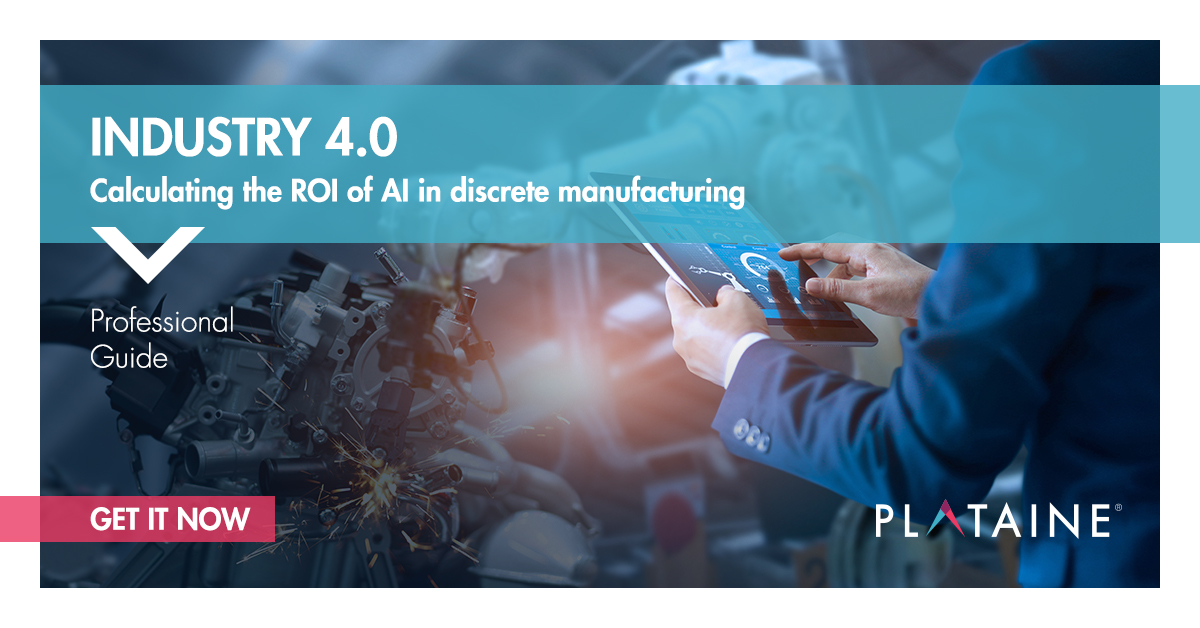Introduction – Industry 4.0 and the SMBs: what is the problem?
As a provider of Industry 4.0 solutions for advanced manufacturing, we often hear small and medium size manufacturers (SMBs) tell us they are concerned Industry 4.0 and IIoT is only suitable for large industrial corporations.
The advantages Industry 4.0 technologies deliver are clear: streamlined production, increased capacity and throughput, improved quality and audit readiness, reduced re-work and waste, and total visibility across all your production processes.
So, the question is, what’s holding SMBs back from implementing Industry 4.0 and IIoT-based solutions?
The concerns SMBs have surrounding Industry 4.0 and IIoT, tend to focus on five core issues:
- Uncertainty about ROI
- Lack of access to investment capital for large CAPEX costs
- IT and cybersecurity infrastructure uncertainties
- Lack of designated employees to effectively manage the implementation process of these solutions
- A general feeling that the IIoT landscape is designed to serve the needs of larger industrial corporations
The reality is that these concerns are easily addressed by professional providers of Industry 4.0 and IIoT solutions. Industry 4.0 – in fact – offers a totally level playing field for SMBs. The most up-to-date solutions are cloud-based and easily scalable to grow alongside the businesses they serve, meaning they do not require large upfront capital expenditures thus they often carry impressive ROI potential. Meanwhile, cloud-technology and AI can address most worries about existing IT and cyber-security infrastructure, as well as concerns about a lack of IIoT-savvy personnel – all these things can be provided remotely through the cloud by the solution provider.
Finally, when it comes to worries about Industry 4.0 vendors seeming to prioritize larger customers – well, that depends on which IIoT tech companies you speak to.
A recent Accenture report showed that while many SMBs want to embrace digital technology, they seem to struggle with the adoption process. The same report, though, also found that “Digitally-savvy SMBs have consistently higher revenue growth projections”.
At Plataine, we are concerned that there is a very large part of the SMB market and Tier 2 and Tier 3 suppliers that is seriously lagging with IIoT solutions’ adoption. This is a pity because smaller suppliers actually have more to gain from Industry 4.0 and IIoT, and are better positioned to adopt it, than any other sector of the industrial and manufacturing community. How is that so?
SMBs – uniquely positioned to benefit from Industry 4.0 and IIoT
Often, industrial SMBs are market leaders in their niches, and yet they are more likely than larger businesses to be labor intensive and to use less efficient processes. That’s because large businesses have the resources to purchase expensive machinery and employ teams dedicated to improving internal operations. SMBs usually do not have the resources for this – they tend to be fully focused on how they can win more projects, rather than how they can improve internal processes. So, sometimes, inefficient processes can remain in use for years.
Let’s imagine a small supplier with 100-200 employees. Often, such companies rely on manual processes, with vital data documented on paper, or stored in Excel spreadsheets. The time wasted on manual reporting and searching for information – which may be needed to manufacture and complete work orders – results in multiple problems, poor quality control and occasionally, production delays. A digital manufacturing solution can seamlessly turn a small factory into a paperless production, ending these problems at a stroke.
Of course, internal inefficiencies don’t stop many SMBs being hugely successful, but they do mean that there is often room for improvement. An Industry 4.0 solution can improve the smallest of industrial operations through automation and process efficiencies.
Ultimately, if you are not using up-to-date tech, then your worker productivity is lower than it could be, and naturally you wouldn’t like that to happen. Particularly in this era when, in many countries, the labor market has never been tighter. Looking beyond productivity, if you are having trouble finding (or affording) people with the technical skills you need, it may be that the AI capabilities offered by a smart software solution can go a long way filling the gaps in your workforce. Ultimately, if you are a supplier who is doing well, now could be just the time to look into embracing digital manufacturing and Industry 4.0 – after all, it’s always better to fix the roof while the sun is shining.
A small & medium business is an agile business
It is also the case that SMBs have a major advantage when adopting Industry 4.0 and IIoT – their small size! A 2020 World Economic Forum whitepaper – which examined the adoption of IIoT by SMEs – points out that small companies tend to have far simpler, flatter organizational structures than big corporations. I’ve often heard SMB managers say that a key advantage they have over big organizations is that they are nimble and flexible enough to respond to sudden changes in the market. There is no need to navigate a large internal team of stakeholders, meaning fewer delays. But how often do SMBs take advantage of this agility when it comes to adopting innovation?

Cloud computing – scalability
Industry 4.0 technologies may sound expensive, but they aren’t. And, when the solution is implemented, it more than pays for itself. I can fully understand why SMB leaders would hesitate, but recent advances in cloud computing have been staggering. The business models of the companies behind cloud computing infrastructure (such as Amazon Web Services and Microsoft for example) mean that virtually limitless computing power is available at a rock-bottom cost. These days, it’s possible to process and analyze immense reams of data by renting cheap computing power in the cloud; giving you on-demand access to the most powerful computing infrastructure and platforms on the market, without the need to invest in on-premise equipment. You do not need your own computing or server infrastructure, and you don’t need to worry about maintaining and updating computing hardware, software, or staff to keep it operating and up to date.
Meanwhile, your Industry 4.0 solution provider can manage all software applications and updates, ensuring total compatibility for all your systems, and reducing the complexity of system integration to a minimum. Finally, the system means you only rent exactly the computing capacity you need – and you can dial it up or down almost instantaneously.
IIoT – modular, scalable and customizable
The same goes for the IIoT solution itself. IIoT technology is modular and customizable, and it is as easily scalable as the cloud-computing capacity it depends on. Indeed, the extreme scalability of a cloud-based IIoT solution means it can move in lockstep with the needs of your business – scaling up to meet rapid customer growth and, just as rapidly, scaling down again if demand falls. This makes advanced IIoT affordable for the smallest industrial operations. Beyond the cloud, the only physical hardware most IIoT operations require is a smart sensor network which, like cloud computing capacity, is completely scalable.
Cyber-security – keeping data on-site is riskier than you think
Cyber-security is always a key concern for companies adopting cloud and IIoT. The assumption is often that a cloud solution is riskier than keeping all data on a company’s own servers. This assumption is wrong. Cloud computing providers are experts at what they do, employing whole teams to manage cyber-security and data backups. Their business depends on protecting their clients’ data. The fact is that a cloud provider such as Microsoft or AWS (Amazon Web Services) knows a whole lot more about cyber-security than the average industrial company. Storing your data on a cloud server is almost always actually safer than keeping it stored on your own servers.
ROI – how to work it out

When it comes to calculating the ROI of an IIoT-based solution, the key is to have clear goals, performance objectives and KPIs. Think about what you are trying to achieve: Do you want to cut material waste? Reduce machine downtime? Improve quality by reducing human error? Or perhaps you want to increase on-time delivery of customer work orders? Whatever it is, your Industry 4.0 provider should be able to advise you on what’s possible, what to expect and how to achieve it. As a starting point, consult our comprehensive eBook on RoI in Industry 4.0.
Summary
SMBs are far more agile and flexible than large enterprises. They can rapidly adapt to changing market realities. This is one of their key attributes. Industrial SMBs that are lagging in Industry 4.0 and IIoT adoption are missing a potentially big advantage. In a world where the large industrial corporations hold so many of the cards in terms of economies of scale and deep pockets for expensive investments, it’s vital that SMBs get on top of the fourth industrial revolution – and stay there.








